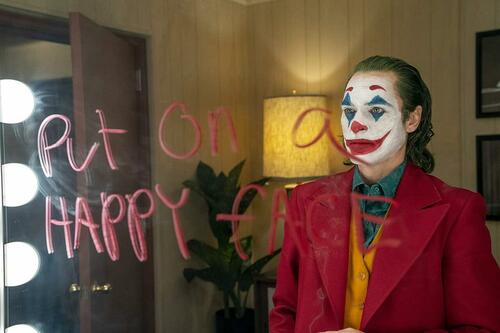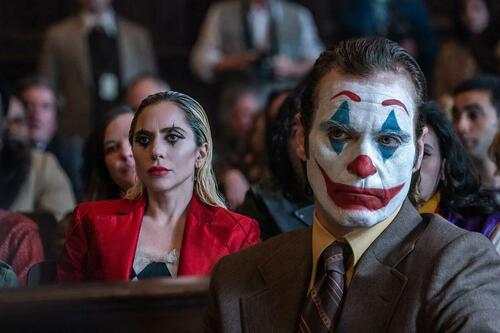
Warner Bros. had a surprise hit in 2019 with the Todd Phillips directed 'Joker' staring Joaquin Phoenix; the movie made over a billion dollars at the box office. Phillips' idea was to "sneak a real movie" into the superhero genre, and to his credit he succeeded in that plan. Joker was a wildly popular but very different take on the DC villain's origin story.
In his second installment of the franchise, Joker: Folie à Deux, Phillips seems to have set out to deconstruct and destroy his own lead character in way that left many audience goers disappointed. The film grabbed $81 million worldwide at the box office opening weekend (keep in mind that half those revenues go to the theater chains), and it cost over $300 million to make and market. Compared that to the first film, which made $247 million worldwide opening weekend and cost only $60 million. Joker 2 has also suffered the largest second week drop in receipts in DC movie history.
Folie à Deux reverses the entire arc of the first movie. This time around Arthur Fleck (the Joker) is trapped in an insane asylum after the vengeful murders of the previous film and is embroiled in his own trial. His rebelliousness has been subdued by medications and he struggles with his alter ego and an abusive prison system. He has musical fantasies in which he's able to be the Joker again, but the scenes fall flat like most dream sequences in movies where the character wishes he was something he's not.
By the end of the film Arthur fires his attorney and defends himself in court, calling out the asylum and it's terrible treatment of patients. The psychotic prison guards return the favor by beating our main character and then, apparently, raping him (the rape is implied, not shown). After the rape, Arthur fleck abandons his Joker image and submits his guilt to the court. In other words, his rebelliousness was raped right out of him.
Finally, he is stabbed to death by his own cellmate.
There are no good guys in this movie, but the only message seems to be that submission to the system is the answer if you want to avoid a horrific fate. Not surprisingly, this did not go over well with fans. But why would Hollywood seek to sabotage a character that their audience finds fascinating? Well, they've been doing that for years now with every beloved franchise, mainly those starring straight white men.
They destroyed Luke Skywalker by making him a bitter, lazy nihilist. They destroyed Indiana Jones by making him a bitter, forgotten aging divorcee. They destroyed James Bond by making him second fiddle to a 90 pound black woman and then killing him. They destroyed the Ghostbusters by replacing the men with unfunny women and pretending the original films didn't exist. There are hundreds of examples of this character assassination since around 2016. It's the reason why Hollywood is failing so spectacularly today.
To be fair, Todd Phillips is perhaps not as good a director as people initially assumed. The first Joker steals a considerable amount of plot and character development from two of Martin Scorsese's best films - Taxi Driver and The King Of Comedy. In fact, The Joker is merely a marriage of those two movies with a little Batman lore mixed in. Arthur Fleck is Rupert Pupkin and Travis Bickle if they had gone even further down the path of rage. In the second film Phillips was starting from scratch and it shows.
In the late 1970s to early 1980s, it was acceptable for Hollywood to portray the plight of disaffected young white men searching for meaning in a world that has forsaken them. Today, the progressive left considers the character of Travis Bickle a monstrous symbol that should never be replicated on the big screen for fear that he might "inspire" all those dangerous white men out there in the real world to act on their inherent terrorist impulses.
The entertainment media was in an uproar, accusing Joker of sympathizing with angry white males in a way that "excused their behavior." 'Medium' argued that The Joker is "actually about the rage that bubbles to the surface when white males are denied the future they think they are entitled to."
Salon claimed that the "American epidemic of white male rage fueled "Joker" to Oscar contention glory, but also the film's downfall."
White men are not allowed to feel disaffected or angry, because supposedly the "patriarchy" is built to cater to them. White men are so dangerous they have to be suppressed, lest they wake up one day and start a fascist revolution.
In the DC comics the Joker is an unabashed psychopath seeking to prove that, deep down, everyone else is just as corrupted as he is. In the Todd Phillips movie, Joker is an empathetic character created by an abusive and broken society that only offers him drugs to numb the pain of existence. Again, you aren't supposed to feel bad for straight white men or understand why they might become violent.
In Taxi Driver, Travis Bickle decides he's going to go lone wolf from society and make his mark instead of living in obscurity. He has a choice to use his newfound freedom for good or evil. It's hard to say if he chooses to do good because he wants to or because it's easier, but in the end he aims his aggression at terrible people and saves the life of an innocent girl.
In the first Joker, Arthur Fleck has no real choice. He must either embrace the clown and lash out, or be crushed under the boot of the system. At the end of the film, Fleck becomes a symbol of chaos and revenge and, like Travis Bickle, finds a strange kind of freedom. In the second movie, Todd Phillips and Hollywood in general attempt to remedy their previous mistake by not only killing the character, but absolutely humiliating him and then forcing him to abandon his ideals before he dies.
Many people might assume that the woke left is attracted to symbols of anarchy and chaos, but the truth is they only use those dynamics as weapons to gain power.
They love authoritarian order, as long as it's applied against the people they hate. Joker: Folie à Deux is yet another reminder of how the political left really thinks.
The underlying message of the movie? The corrupt system always wins, so conform or you'll be next.
Warner Bros. had a surprise hit in 2019 with the Todd Phillips directed ‘Joker’ staring Joaquin Phoenix; the movie made over a billion dollars at the box office. Phillips’ idea was to “sneak a real movie” into the superhero genre, and to his credit he succeeded in that plan. Joker was a wildly popular but very different take on the DC villain’s origin story.
In his second installment of the franchise, Joker: Folie à Deux, Phillips seems to have set out to deconstruct and destroy his own lead character in way that left many audience goers disappointed. The film grabbed $81 million worldwide at the box office opening weekend (keep in mind that half those revenues go to the theater chains), and it cost over $300 million to make and market. Compared that to the first film, which made $247 million worldwide opening weekend and cost only $60 million. Joker 2 has also suffered the largest second week drop in receipts in DC movie history.
Folie à Deux reverses the entire arc of the first movie. This time around Arthur Fleck (the Joker) is trapped in an insane asylum after the vengeful murders of the previous film and is embroiled in his own trial. His rebelliousness has been subdued by medications and he struggles with his alter ego and an abusive prison system. He has musical fantasies in which he’s able to be the Joker again, but the scenes fall flat like most dream sequences in movies where the character wishes he was something he’s not.
By the end of the film Arthur fires his attorney and defends himself in court, calling out the asylum and it’s terrible treatment of patients. The psychotic prison guards return the favor by beating our main character and then, apparently, raping him (the rape is implied, not shown). After the rape, Arthur fleck abandons his Joker image and submits his guilt to the court. In other words, his rebelliousness was raped right out of him.
Finally, he is stabbed to death by his own cellmate.
There are no good guys in this movie, but the only message seems to be that submission to the system is the answer if you want to avoid a horrific fate. Not surprisingly, this did not go over well with fans. But why would Hollywood seek to sabotage a character that their audience finds fascinating? Well, they’ve been doing that for years now with every beloved franchise, mainly those starring straight white men.
They destroyed Luke Skywalker by making him a bitter, lazy nihilist. They destroyed Indiana Jones by making him a bitter, forgotten aging divorcee. They destroyed James Bond by making him second fiddle to a 90 pound black woman and then killing him. They destroyed the Ghostbusters by replacing the men with unfunny women and pretending the original films didn’t exist. There are hundreds of examples of this character assassination since around 2016. It’s the reason why Hollywood is failing so spectacularly today.
To be fair, Todd Phillips is perhaps not as good a director as people initially assumed. The first Joker steals a considerable amount of plot and character development from two of Martin Scorsese’s best films – Taxi Driver and The King Of Comedy. In fact, The Joker is merely a marriage of those two movies with a little Batman lore mixed in. Arthur Fleck is Rupert Pupkin and Travis Bickle if they had gone even further down the path of rage. In the second film Phillips was starting from scratch and it shows.
In the late 1970s to early 1980s, it was acceptable for Hollywood to portray the plight of disaffected young white men searching for meaning in a world that has forsaken them. Today, the progressive left considers the character of Travis Bickle a monstrous symbol that should never be replicated on the big screen for fear that he might “inspire” all those dangerous white men out there in the real world to act on their inherent terrorist impulses.
The entertainment media was in an uproar, accusing Joker of sympathizing with angry white males in a way that “excused their behavior.” ‘Medium’ argued that The Joker is “actually about the rage that bubbles to the surface when white males are denied the future they think they are entitled to.”
Salon claimed that the “American epidemic of white male rage fueled “Joker” to Oscar contention glory, but also the film’s downfall.”
White men are not allowed to feel disaffected or angry, because supposedly the “patriarchy” is built to cater to them. White men are so dangerous they have to be suppressed, lest they wake up one day and start a fascist revolution.
In the DC comics the Joker is an unabashed psychopath seeking to prove that, deep down, everyone else is just as corrupted as he is. In the Todd Phillips movie, Joker is an empathetic character created by an abusive and broken society that only offers him drugs to numb the pain of existence. Again, you aren’t supposed to feel bad for straight white men or understand why they might become violent.
In Taxi Driver, Travis Bickle decides he’s going to go lone wolf from society and make his mark instead of living in obscurity. He has a choice to use his newfound freedom for good or evil. It’s hard to say if he chooses to do good because he wants to or because it’s easier, but in the end he aims his aggression at terrible people and saves the life of an innocent girl.
In the first Joker, Arthur Fleck has no real choice. He must either embrace the clown and lash out, or be crushed under the boot of the system. At the end of the film, Fleck becomes a symbol of chaos and revenge and, like Travis Bickle, finds a strange kind of freedom. In the second movie, Todd Phillips and Hollywood in general attempt to remedy their previous mistake by not only killing the character, but absolutely humiliating him and then forcing him to abandon his ideals before he dies.
Many people might assume that the woke left is attracted to symbols of anarchy and chaos, but the truth is they only use those dynamics as weapons to gain power.
They love authoritarian order, as long as it’s applied against the people they hate. Joker: Folie à Deux is yet another reminder of how the political left really thinks.
The underlying message of the movie? The corrupt system always wins, so conform or you’ll be next.
Loading…







